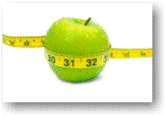Being overweight or underweight can affect your recovery from surgery. One way to check if you have a healthy body weight is to calculate your Body Mass Index (BMI). Your BMI is a measure of your body fat, based on your height and weight.
The BMI Categories are:
- Underweight = <18.5
- Normal weight = 18.5-24.9
- Overweight = 25-29.9
- Obesity = BMI of 30 or greater
A high BMI is a sign that you should reduce your weight. To determine your BMI, enter your weight and height into Weight Watchers of Canada easy calculator. For more information on specific health risks of each BMI category, visit Health Canada. You can talk to a registered dietician about what a healthy weight would be for you.
Underweight
Being underweight can slow down your healing and recovery process after surgery. It is important to eat well both before and after your surgery to make sure your body has the nutrients it needs to allow you to heal properly. Patients who are underweight can suffer from poor bone health, lower energy and a weaker immune system, giving them a higher chance of infection.
Overweight
For each extra pound of weight a person carries, it puts an extra 3 to 6 pounds of force on your knee and hip joints. This means that losing weight can lead to less pain and more mobility. Getting rid of excess weight can impact your mobility after surgery and how long your new joint will last.
 If you are overweight, try to aim for steady weight loss (one pound a week) before surgery. Many patients feel that losing weight is an impossible task because they have trouble moving and exercising from their pain. If this is the case, listen to the nutrition experts that say eating healthier food and having smaller meal sizes can have a big effect on weight loss.
If you are overweight, try to aim for steady weight loss (one pound a week) before surgery. Many patients feel that losing weight is an impossible task because they have trouble moving and exercising from their pain. If this is the case, listen to the nutrition experts that say eating healthier food and having smaller meal sizes can have a big effect on weight loss.
Some tips to help you reduce weight:
- Eat small meals more frequently
- Don’t skip breakfast
- Don’t rush eating your meals, spend at least 20 min/meal
- Drink low calorie beverages (e.g. water, fruit/vegetable juice)
- Eat more vegetables
- Do not eat two hours prior to bedtime.